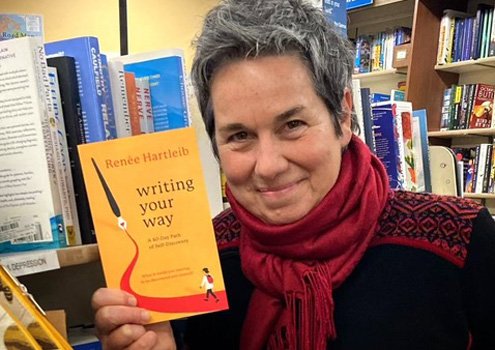Reading time: About 2 minutes
Renée Hartleib says that building the habit of writing is far more dependable than relying on inspiration…
Renée Hartleib is a Canadian writer, editor and writing mentor based out of Halifax, Nova Scotia. She is the author of Writing Your Way: A 40-Day Path of Self-Discovery and Solo Camino: An Empowering Guide for Women. A graduate of the Humber School of Writers, Renée has had short fiction published in both literary journals and anthologies. She is passionate about helping and inspiring creatives and offers both online programs and one-on-one support for writers looking for accountability, coaching, or developmental editing.
I was excited to talk to Renée about how she approaches writing.
Q. Roughly how much time do you spend writing every day?
When I’m working on a book, I write three to fours hours a day. When possible, I set aside one whole day per week that is open so that if the writing is going well, I can just keep going.
Q. What’s a simple activity or habit that makes you a better writer?
I use the Pomodoro Technique, which is essentially timed writing segments. I set an intention about what I’m going to try to complete (e.g., this chapter, this scene, this piece of dialogue) and then set a timer for 25 minutes. These short bursts of activity feel manageable and make me feel both productive and good about myself.
Q. What interferes with your writing?
My inner critic. My own unexamined beliefs and the way I talked to myself stood in the way of my writing for decades. Learning how to quiet that inner voice has been powerful and liberating and has allowed me to write books.
Q. How do you persuade yourself to sit down to write on days when you really, really DON’T feel like doing it?
I always remind myself how much better I will feel when I’m done. It’s the same thing with exercise! Sometimes it’s hard to get motivated, but I’ve found when you actually do the thing you are resisting, there is always an emotional payoff.
Q. Is there a particular motto or saying that you’ve found helpful for writing?
“First forget inspiration. Habit is more dependable. Habit will sustain you whether you’re inspired or not. Habit will help you finish and polish your stories. Inspiration won’t. Habit is persistence in practice.” ~Octavia E. Butler. I always encourage my clients to create a writing practice for themselves, preferably at the time of day where they are their best and brightest (for me it’s the morning). Prioritize this time by putting it in your calendar. Even if life interferes and you miss a day, there is always tomorrow and another chance for you to honour your commitment.
Q. Which stage of the writing process do you enjoy the most: researching, writing or editing/rewriting and why?
Definitely writing the first draft. I love the sense of freshness and possibility as I’m exploring ideas and just getting things down on the page. During this invigorating time, I seem to conveniently forget that I’m going to have to go back in and rewrite and then edit and then rewrite again, ad nauseam. As you might be able to tell, these other aspects of the writing process are not as fun to me.
Q. What’s one of the best books you’ve read (either fiction or non) in the last five years?
Too many to choose from! Some of my fave writing books are The War of Art by Stephen Pressfield, If You Want to Write by Brenda Ueland, and Bird by Bird by Anne Lamott. And recent fiction standouts are Tin Man by Sarah Winman, Demon Copperhead by Barbara Kingsolver, and absolutely anything by Elizabeth Strout.
Q. What book are you reading right now?
I’m re-reading On Chesil Beach by Ian McEwan (slim but so powerful) and am just about to start Orbital by Samantha Harvey.
Q.What do you think is the biggest misperception that new writers have about the act of writing?
In my experience, new writers don’t yet understand how much revision and editing goes into the books they see on store shelves written by their favourite authors. This misconception that other people’s writing comes out perfectly fuels their own negative self-talk (“I’m not as good as that writer, so why bother?”)


